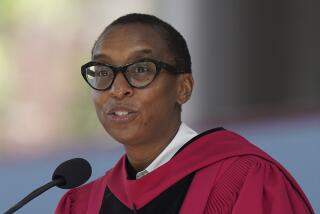Plagiarism: A ‘Yes, but’ Issue?
- Share via
Recent reports that Martin Luther King Jr. and Bruno Bettelheim plagiarized from other scholars have left many groping to reconcile behavior seemingly at odds with these honorable men. Searching, in other words, for “yes, but” explanations.
Yes, King evidently lifted sections of his 1955 Ph.D dissertation without proper attribution. But the indisputable greatness of the civil rights leader rests not on his academic credentials. Yes, Bettelheim apparently plagiarized whole passages and key ideas in his award-winning 1976 book “The Uses of Enchantment.” But his fame as a child psychologist lay in his ability to make old ideas new.
Still, the “yes” should give us pause. To use another’s work without attribution is stealing. Charges of plagiarism have been leveled in recent years against several writers, politicians and even comedians. But arguably the most troubling context in which plagiarism arises--and that in which the King and Bettelheim cases arose--is academia. In recent decades, too many universities admitted into graduate programs far more students than the academic job market justified, producing an almost Darwinian race for survival by dissertation and publication. Those students who successfully ran the gauntlet to a teaching position found the demand to publish or perish only intensified. Given these pressures, the temptation to “borrow” or steal is undeniable.
Yet society charges the university with fostering and transmitting our most important cultural values and ethics.
Perhaps above all else, the university community values the continuing search for truth and new knowledge. Part of its task is to train undergraduates, graduate students and faculty to honor this quest as well. A scholar’s ideas--words, data or theories--form the basis of that search. For that reason then, plagiarism, the theft of ideas, is the worst of academic sins.
Many universities have responded to egregious plagiarism by stiffening of academic honesty codes. Professional societies and agencies that fund academic research have similar codes of ethics.
But the problem, at base, rests in the conscience of each individual. Few Ph.D students will ever achieve the transcendence of King. Most academicians do not have the imagination of Bettelheim.
King and Bettelheim each left a rich legacy of their own thoughts and deeds. But most academic scholars, and most of the rest of us, will leave a less visible mark on the world. All the more reason then, that our accomplishments--our words and our ideas--be our own.






